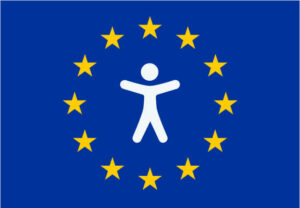The EAA, which comes into force in June 2025, will require publishers selling e-books in the European Union to ensure their titles are usable by people with a wide range of disabilities. TIA editor Roz Morris has compiled this guide to make it as simple as possible.
 What is the EAA?
What is the EAA?
It’s a law that requires products and services sold in the EU to be usable by people with a wide range of disabilities, including impaired vision and hearing.
How does that apply to indie authors?
Two ways: the formatting of e-books and the presentation of stores on author websites.
Does it apply to print books?
No. And breathe.
There is a major exemption
Titles published by microenterprises are exempt. Microenterprises are defined as those that employ fewer than 10 people or have an annual turnover of less than 2 million euros. That encompasses most indie authors.
But don’t put your feet up yet…
The sales platforms are also responsible for meeting the new standards. The International Publishers Association points out that retailers, libraries and e-book platforms may begin rejecting non-compliant content to avoid hefty fines, which are expected to range from €7,500 in France to as much as €60,000 in Ireland. That could mean your books are delisted or removed from EU platforms, and excluded from library systems, and will be unavailable to all readers, not just readers with disabilities.
So it’s worth knowing what will keep your books out of EAA jail.
What does a compliant e-book need?
Text must be resizable and easily visible, with no distracting backgrounds. Navigation in the book needs to be easy and clear, so tables of contents must be accurate and complete. The user also needs the option to have the text read aloud. Metadata should include a book’s accessibility features.
Do authors have to update their metadata on sales platforms or will this be added automatically? This is not yet clear. We are pushing Amazon for answers.
Most e-books already do this, don’t they?
They do. Here’s the very good news. EPUB3, when correctly set up, is fully compatible with assistive technologies. Most of the work is done by the e-reader device or app if the file was prepared correctly.
Unless you’re using PDF
A surprising number of authors are still selling their digital versions as PDF only. PDFs are not e-books in the true sense because they don’t offer the adjustability of the page display. While some of the sales platforms (eg Smashwords/Draft2Digital [D2D]) recommend that you offer PDF as one of your formats, PDF should not be the only format of your e-book.
Here’s an important question.
What did you use to create and check your e-book file?
If you used the conversion facility on Smashwords and D2D or uploaded your own formatted EPUB, their checks ensure you’re good. These two platforms have been concerned about accessibility for a long time so their checking mechanisms have always ensured your book passes the standards.
If you used other popular conversion packages such as Atticus and Vellum, your EPUB3 files also meet the standards.
What about Kindle? If you converted on KDP from an EPUB3, you’re good. The conversion preserves the structuring and functionality. Many authors convert on KDP from Word and some have backlist titles created many years ago. Are they compliant with the new legislation? We have put these questions to Amazon and will update you as soon as we have answers.
If you coded the book some other way and you’re not using a validation tool on a platform’s site (such as D2D) you can validate using the Ace tool from the DAISY Consortium. This is also good if you want to double-check your existing books, including those created from Word files on KDP.
DAISY is a global organization dedicated to ensuring publishing and reading systems are inclusive. Daisy provides free tools, extensive documentation and training resources to help ensure your e-book meets both the EAA standards and global accessibility best practices.
Do you have images in your book?
Illustrations should include descriptive alt-text unless they’re purely decorative, in which case you should leave the description blank. You might run into trouble if you’ve used pictures of text as these are not very visible to readers with impaired visibility.
Have you used tables in your book?
Don’t present them as images as they might be difficult for some readers, for reasons stated above. Make sure you’ve formatted them as part of the text.
Digital rights management (DRM) and other forms of copyright protection
DRM aims to prevent content being copied, modified and distributed without authorization, for instance piracy, but it can interfere with the adjustability of an e-book. DRM isn’t usually coded into the e-book file, it’s added at the sales platform by the author or by the platform’s systems.
Most of the sales platforms don’t offer DRM except for Amazon KDP. So if you’ve put DRM on your Kindle books, should you go into your dashboard and remove it? You can’t, at least not at the time of writing. But as DRM is provided by KDP, not the author’s book file, Amazon might already have ensured it doesn’t hinder the file’s usability. We are seeking clarification.
Some platforms offer newer, less restrictive options like Readium Licensed Content Protection (LCP), that comply with accessibility standards. Readium is increasingly used by library systems and indie-friendly retailers across Europe. Another anti-copying option is watermarking each book with an identifier, which is used by BookFunnel.
If you're worried about protecting your content, ask your distributor or aggregator about Readium LCP, watermarking or a similar function.
What about fixed format e-books?
Most e-books are reflowable – the layout is governed by the user via the device. But some e-books are created with a fixed format, where the author/designer/publisher dictates design features such as font size, more like a conventional print book. Fixed-format e-books might find themselves in contravention of the Act – but there are exemptions.
The exemption!
The Act allows for limited exemptions in cases like graphic novels, children’s books or art books where compliance would fundamentally alter the work.
Our best advice is this: don’t issue an e-book as fixed format unless there is a compelling reason to present it that way.
What about your backlist?
For e-books already on the market, you have five years’ grace, until 28 June 2030, to make the necessary adjustments. In practice, we’ve already seen that most books will probably satisfy the requirements. If you’re worried, you can double-check with a free third-party tool like Ace from DAISY.
Authors selling direct
Online bookstores also need to be accessible – what does this mean for authors selling direct?
If your shop is powered by one of the common e-commerce platforms, they may already be on the case.
Shopify says: “Shopify uses the Web Content Accessibility Guidelines (WCAG) version 2.1 as its guiding principle. As we create new products, the principles of accessible design and development are an integral part of conception and realization. https://www.shopify.com/uk/accessibility”
WooCommerce says it is keeping a close eye on accessibility requirements and legislation throughout the world – find its statement here: https://developer.woocommerce.com/2024/08/09/elevating-ecommerce-accessibility-an-interview-with-equalize-digital-and-woocommerces-progress/
At the time of writing we couldn’t find any statements from the other two popular ecommerce platforms, Payhip and Gumroad.
If your platform is self-built, as some authors’ are, you might need to consult your coder to establish whether it is friendly to customers. They may need to check features such as contrast adjustments to increase visibility, opacity functions and navigation for people who cannot use a mouse.
Looking to the future
As we’ve seen, the penalties are unlikely to be levied directly on authors, but authors may pay the price if platforms choose to remove or deprioritise our work.
So it makes good business sense to build accessibility into our e-book publishing process. It’s good for our readers, our reputations and our reach in the inclusive digital landscape. Accessible e-books are better e-books.
Roz Morris publishes literary fiction, creative non-fiction and writing craft books. She’s ALLi’s editor-in-chief. Her website is here and you can tweet/X her on @Roz_Morris
Thoughts or further questions on this post or any self-publishing issue?
 If you’re an ALLi member, head over to the SelfPubConnect forum for support from our experienced community of indie authors, advisors, and our own ALLi team. Simply create an account (if you haven’t already) to request to join the forum and get going.
If you’re an ALLi member, head over to the SelfPubConnect forum for support from our experienced community of indie authors, advisors, and our own ALLi team. Simply create an account (if you haven’t already) to request to join the forum and get going.
Non-members looking for more information can search our extensive archive of blog posts and podcast episodes packed with tips and advice at ALLi's Self-Publishing Advice Center.




